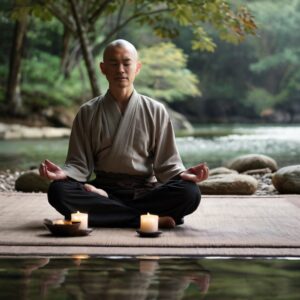Zen meditation, also known as Zazen, is a meditative discipline that is typically associated with the Zen Buddhist tradition. Originating from the Chinese Zen Buddhism (Chan Buddhism), which itself was influenced by Indian Mahayana Buddhism, the practice has been an integral part of Buddhist training and lifestyle. Over the centuries, it has evolved and spread across the globe, offering practitioners a method to quiet the mind and attain insights into the nature of existence and consciousness.
Origins and Historical Development

Zen Buddhism’s transmission to Japan heralded a significant evolution of the practice and philosophy of Zen meditation. When influential monks such as Eisai and Dogen traveled to Japan in the early 12th century, they introduced Zen and tailored it to the cultural and spiritual landscape of Japan. Eisai was the first to introduce the Rinzai school of Zen to Japan after studying in China. Rinzai Zen is known for its method of kensho (seeing one’s true nature), typically facilitated through rigorous koan (cryptic Zen riddles) practice, as well as a strong emphasis on sudden awakening. This school’s practice often involves intense and dynamic meditation sessions that aim to jolt the practitioner into enlightenment.
Dogen, who later founded the Soto school after his own study trip to China, provided a softer contrast to Eisai’s Rinzai approach. The Soto school’s practice primarily revolves around ‘shikantaza’ or “just sitting,” a method where the practitioner maintains a position of open awareness without any specific object of concentration. This style of meditation seeks a gradual development of insight through serene reflection and mindfulness of the body and mind in the present moment. Unlike Rinzai, it shuns the use of koans for awakening and places a significant emphasis on meditation as a manifestation of inherent enlightenment.
This divergence in meditative focus between Rinzai and Soto underscores a broader spectrum of philosophical interpretations within Zen on how enlightenment can be achieved and expressed. While the Rinzai school is often seen as more esoteric and dynamic, the Soto school is viewed as more accessible and methodical, emphasizing continuous practice and gradual awakening.
This differentiation in practice and philosophy adapted Zen to the distinct spiritual needs and inclinations of the Japanese at the time, encouraging a broader acceptance and integration of Zen practice into everyday life. Over centuries, these schools of Zen have persisted and have also influenced the spiritual undercurrent of Japan significantly, contributing deeply to its arts, culture, and ways of living. This framework laid by Eisai and Dogen has been crucial in guiding the interpretation and adaptation of Zen, making it a versatile and enduring path to spiritual insight and personal harmony.
The Practice of Zen Meditation
Zen meditation involves sitting in a quiet and stable posture and focusing the mind. Unlike many other forms of meditation that involve chants or guided imagery, Zen meditation is characterized by a ‘bare attention’ to the physical and mental experience without attachment or active thought.
- Posture: The traditional posture for Zen meditation is the lotus or half-lotus position, which involves sitting on a cushion (zafu) and crossing your legs while keeping your back straight. This posture facilitates the kind of diaphragmatic breathing that is conducive to deep meditation.
- Breathing: Central to the practice is observation of the breath. Practitioners are generally instructed to breathe slowly and deeply, counting breaths if needed, to keep the mind focused and steady.
- Focus: The primary object of focus is the breath, but practitioners may also focus on a koan (a paradoxical anecdote or riddle, used in Zen practice to provoke enlightenment or test a student’s progress). The goal is to maintain a vigilant awareness of the present moment, allowing thoughts and sensations to arise and pass without attachment.
- Environment: While Zen meditation can be done anywhere, it is often practiced in a quiet and minimally distracting environment. Many practitioners attend sessions at a Zen center or temple where a group sits together in silence, facilitating a deeper communal meditative experience.
Psychological and Health Benefits
The psychological and health benefits of Zen meditation extend far beyond the immediate relaxation it provides during practice. Research into its long-term effects reveals significant modifications in brain function and structure, often referred to as neuroplasticity. Studies using MRI scans have shown that regular Zen meditation can lead to increased thickness in areas of the brain associated with attention, interoception, and sensory processing. This anatomical change is believed to contribute to the practitioner’s enhanced capacity to remain focused, process emotional stimuli more effectively, and maintain a calm demeanor in challenging situations.
Engaging in Zen meditation regularly has been correlated with a decline in the production of stress hormones such as cortisol. This biochemical decrease plays a crucial role in mitigating the effects of stress on the body and mind, helping to prevent chronic conditions such as hypertension, heart disease, and certain types of anxiety disorders. By moderating stress in this way, Zen practitioners often experience improved overall health and well-being.
Psychologically, the practice of Zen meditation encourages a profound shift in self-perception and world view. As practitioners maintain a non-attached awareness, observing their thoughts and emotions as they arise and pass, they cultivate what is known in psychological terms as ‘metacognitive awareness.’ This ability enhances mental flexibility and objectivity, reducing the impact of negative thoughts and feelings. The regular practice of observing without attachment helps to diminish the authority and frequency of distressing thoughts, which can lead to more persistent feelings of peace and stability.
This state of ‘no-mind,’ which Zen practitioners often report, refers to a specific quality of mind that is free from the dualities of thought that typically occupy human consciousness. In this state, the mind does not dwell on past regrets or future anxieties, nor does it succumb to the endless categorization and judgment that characterize ordinary mental activity. Achieving this state can lead to profound psychological relief and clarity, as one learns to experience life more fully in the present moment, appreciating the simplicity and richness of now without the overlay of excessive thought and worry.
The confluence of these benefits contributes to what many describe as a greater sense of peace and mental clarity, fostering a resilient mental state where challenges are met with grace and equanimity. This holistic enhancement of mental health improves personal quality of life and can also improve interpersonal relationships and professional productivity, demonstrating the far-reaching implications of regular Zen meditation practice.
Spiritual Benefits
Zen meditation is deeply rooted in the spiritual goal of profound enlightenment or the realization of one’s true nature. This is often described in terms of experiencing an awakening or ‘satori’, which is the embodiment of the non-dualistic nature of reality. Such experiences are said to transform an individual’s understanding of self and other, leading to a more harmonious and detached engagement with the world.
The continuing popularity of Zen meditation around the world attests to its vast range of benefits that extend beyond simple relaxation. By fostering a deep sense of awareness, emotional balance, and spiritual insight, Zen meditation provides a comprehensive tool for dealing with the complexities of modern life and enhancing overall well-being.
While the practice may appear daunting at first, those who persist often find that Zen meditation enriches their life in ways that are profound and far-reaching.
